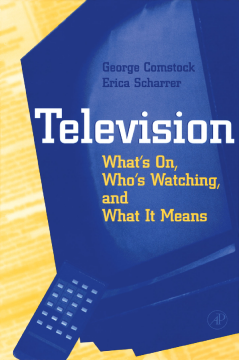
Additional Information
Book Details
Abstract
Television: What's On, Who's Watching, and What It Means presents a comprehensive examination of the role of television in one's life. The emphasis is on data collected over the past two decades pointing to an increasing and in some instances a surprising influence of the medium. Television is not only watched but its messages are attended to and well understood. There is no shame in spending hours in front of the set, in fact, people over-estimate the time they spend viewing. Television advertising no longer persuades--it sells by creating a burst of emotional liking for the commercial. The emphases of television news determine not only what voters think about but also the presidential candidate they expect to support on election day. Children and teenagers who watch a great deal of television perform poorly on standardized achievement tests, and among the reasons are the usurpation of time spent learning to read and the discouragement of book reading. Television violence frightens some children and excites others, but its foremost effect is to increase aggressive behavior that sometimes spills over into seriously harmful antisocial behavior.
- Incorporates social psychology, political science, sociology, child development, and the growing field of communications
- Presents tables and graphs clarifying theories and linking sets of data
- Paints concise portraits of the role of television in entertainment, politics, and child-rearing
- Contains background for dozens of lectures and articles
- Contains a comprehensive bibliography of more than 1000 citations, many recent
"The renewed debate about media violence makes this comprehensive survey of empirical research on television viewers, content, and effect particularly timely...Highly recommended for all collections." --CHOICE, October 1999
"This volume belongs on the bookshelf of all serious media researchers."--JOURNALISM AND MASS COMMUNICATION QUARTERLY
"George Comstock and his former graduate student, Erica Scharrer, examine an impressive array of studies (more than 1,100 are cited) in an attempt to describe the content of TV and to synthesize knowledge about people's uses of TV and the micro- and macroeffects of TV viewing. Comstock is the right person to take on this challenge. During the past quarter century, he has established himself as one of the leading scholars on the influence of TV in American life... the authors... make a significant contribution to an understanding of the role and impact of TV in our lives... the authors do a fine job of distilling and making sense out of the array of often conflicting studies about the content of TV and its effects... The book offers an excellent synthesis of social science research on TV: the essentials about TV--its content, uses, and effects. I recommend the book to all psychologists who are interested in the nature and effects of TV in contemporary America." --CONTEMPORARY PSYCHOLOGY, Vol. 45, 2000
